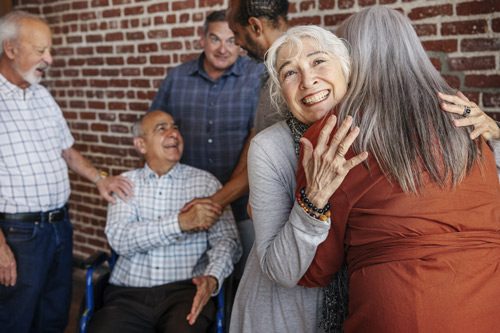
Why Is Addiction in Senior Citizens Hard to Detect?
It can be difficult for doctors, family, and friends of an older adult to recognize that the person has a problem with drugs or alcohol. Once a person retires, excessive drinking or drug use does not interfere with work. They usually have more time alone and become good at hiding their drug or alcohol use. Many times, the symptoms of addiction are mistaken for the signs of aging. In some instances, even if family or friends notice the substance use, they ignore it. Sometimes they justify it by saying the person is old and should be allowed to keep doing whatever makes them happy.
Causes Of Addiction In Seniors
Several things may contribute to substance abuse and addiction when a person is in their later years. Often, life-changing events or health-related issues take an emotional toll. The person may experience the death of a spouse, family member, close friend, or pet. Their physical or mental health may be declining, causing depression, major surgeries, or memory loss. They may have to relocate or move to an assisted living or nursing home.
Retirement can lead to loneliness and a loss of purpose, as people try to find a way to fill the days with meaning. Financial concerns may arise if the person does not have a robust retirement package. These life changes can cause anxiety, and some seniors turn to alcohol or drugs as a way to cope.
What Are the Substances Most Commonly Abused by Seniors?
1 – Alcohol is the drug most commonly abused by senior citizens. The National Institute on Drug Abuse states that approximately 65% of older Americans report high-risk drinking. Binge drinking is reported by more than one-tenth of people 65 and older. As a person ages, their body has less tolerance for alcohol. They feel the effects of the drug quicker than when they were young.
2 – Prescription drugs are given to seniors for many chronic health conditions. People in this age group take more medications than people of other ages, putting them at a higher risk of taking medicines that are potentially addictive. Older adults often mix over-the-counter medications, dietary supplements, and prescription medications without knowing the dangers of possible drug interactions. The most commonly abused addictive prescription drugs include:
- Opioids for pain control: Oxycontin, Percocet, Vicodin
- Benzodiazepines to treat panic attacks, anxiety, or insomnia: Xanax, Ativan, Valium, Klonopin
- Sedative-hypnotics: Ambien, Lunesta, Sonata
3 – Illicit drugs are used by seniors but not as often as they are by younger and middle-aged adults. The most common illicit drugs used are cocaine, heroin, and marijuana.
Signs of Addiction in Senior Citizens
If you suspect that an older adult you love is misusing alcohol or prescription drugs, pay attention to their behavior and appearance. It can be easy to confuse signs of aging with signs of addiction, but you will likely notice sudden or exaggerated changes. Look for the following signs.
- Frequent injuries
- Signs of cognitive impairment (confusion, memory loss, forgetfulness)
- Slurred speech
- Sudden and unpredictable mood swings
- Running out of prescription medications too early
- A lot of empty beer, wine, and liquor bottles
How to Help
If you see the signs of addiction in an older loved one, know that it’s not too late to get help. Addiction might help a person temporarily push aside their pain, but it is not making that person happy. It is accelerating the aging process and leading to even greater physical, cognitive, and emotional difficulty than would otherwise occur. So the first thing you can do to help someone you love is to take their problem seriously.
Then, you can talk gently with your loved one. Explain to them what you’re seeing in their behavior and that you’re concerned about how much alcohol, drugs, or medication they’re using. Offer them help in finding treatment, and explain what will be involved in treatment:
- medically supervised detoxification in a comfortable environment
- individualized care in the form of individual and group therapy
- holistic therapies to improve physical, mental, and emotional well-being
In addition, explain how getting treatment will improve their lives:
- Greater clarity
- More independence with less potential for physical injury
- Better overall health, which can lead to more energy for activities
- Connection with others: people they meet in treatment, people in their recovery support group, etc.
- Opportunities to give back (through volunteering, being a sponsor for younger people who are in recovery, and more)
- Knowledge about and access to alternative ways to manage pain and insomnia that won’t compromise their health
If you find that your loved one is unwilling to listen or get help, you can consult with their primary doctor to express your concerns and get advice on what to do next. Depending on the situation, you might also want to arrange for a professional intervention.
Are You Struggling with Addiction?
If you or a loved one is struggling with an addiction to alcohol or drugs, help is available. You are not alone. At English Mountain Recovery, located in the Smoky Mountains of Tennessee, our professional team will help you regain your sobriety. Now is the time to take the first step and call English Mountain. We will answer your questions and help you along your path to recovery.
 Are you or a loved one searching for drug addiction treatment near Knoxville? To learn more about programs offered at English Mountain Recovery, call and speak with someone today at (877) 615-8569. We are ready to help you or your loved one recover.
Are you or a loved one searching for drug addiction treatment near Knoxville? To learn more about programs offered at English Mountain Recovery, call and speak with someone today at (877) 615-8569. We are ready to help you or your loved one recover.About the Author: 
Terry Hurley is a retired educational professional and freelance writer with more than fifty years of experience. A former reading specialist and learning center director, Terry loved her years working with children in the educational field. She has written extensively for print and online publications specializing in education and health issues. For the last six years, her writing focus has been on addiction and mental health issues.




